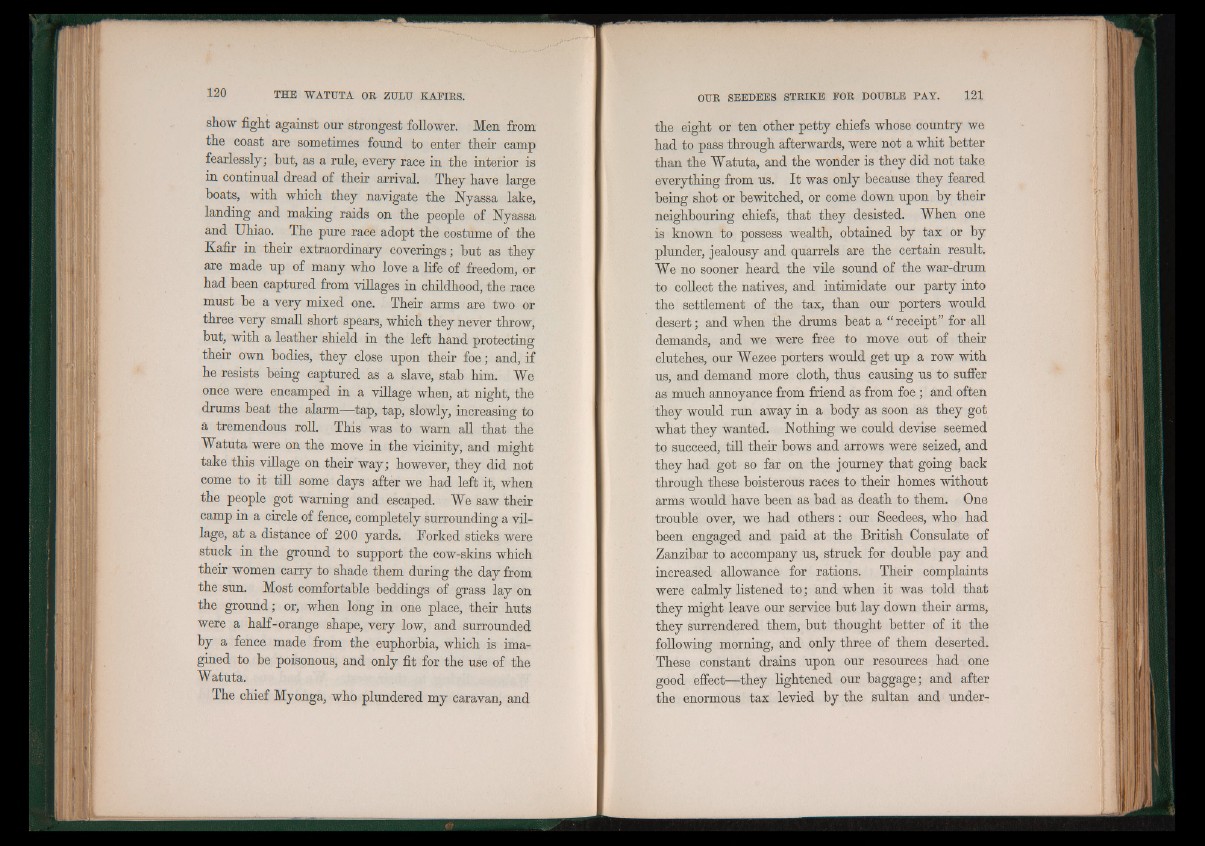
120 THE WATUTA OR ZULU KAFIRS.
show fight against our strongest follower. Men from
the coast are sometimes found to enter their camp
fearlessly; but, as a rule, every race in the interior is
in continual dread of their arrival. They have large
boats, with which they navigate the Nyassa lake,
landing and making raids on the people of Nyassa
and Uhiao. The pure race adopt the costume of the
Kafir in their extraordinary coverings; but as they
are made up of many who love a life of freedom, or
had been captured from villages in childhood, the race
must be a very mixed one. Their arms are two or
three very small short spears, which they never throw,
but, with a leather shield in the left hand protecting
their own bodies, they close upon their foe; and, if
he resists being captured as a slave, stab him. We
once were encamped in a village when, at night, the
drums beat the alarm—tap, tap, slowly, increasing to
a tremendous roll. This was to warn all that the
Watuta were on the move in the vicinity, and might
take this village on their way; however, they did not
come to it till some days after we had left it, when
the people got warning and escaped. We saw their
camp in a circle of fence, completely surrounding a village,
at a distance of 200 yards. Forked sticks were
stuck in the ground to support the cow-skins which
their women carry to shade them during the day from
the sun. Most comfortable beddings of grass lay on
the ground; or, when long in one place, their huts
were a half-orange shape, very low, and surrounded
by a fence made from the euphorbia, which is imagined
to be poisonous, and only fit for the use of the
Watuta.
The chief Myonga, who plundered my caravan, and
OUR S E E D E R S STRIKE FOR DOUBLE PAY. 121
the eight or ten other petty chiefs whose country we
had to pass through afterwards, were not a whit better
than the Watuta, and the wonder is they did not take
everything from us. It was only because they feared
being shot or bewitched, or come down upon by their
neighbouring chiefs, that they desisted. When one
is known to possess wealth, obtained by tax or by
plunder, jealousy and quarrels are the certain result.
We no sooner heard the vile sound of the war-drum
to collect the natives, and intimidate our party into
the settlement of the tax, than our porters would
desert; and when the drums beat a “ receipt” for all
demands, and we were free to move out of their
clutches, our Wezee porters would get up a row with
us, and demand more cloth, thus causing us to suffer
as much annoyance from friend as from foe; and often
they would run away in a body as soon as they got
what they wanted. Nothing we could devise seemed
to succeed, till their bows and arrows were seized, and
they had got so far on the journey that going back
through these boisterous races to their homes without
arms would have been as bad as death to them. One
trouble over, we had others: our Seedees, who had
been engaged and paid at the British Consulate of
Zanzibar to accompany us, struck for double pay and
increased allowance for rations. Their complaints
were calmly listened to; and when it was told that
they might leave our service but lay down their arms,
they surrendered them, but thought better of it the
following morning, and only three of them deserted.
These constant drains upon our resources had one
good effect—they lightened our baggage; and after
the enormous tax levied by the sultan and under